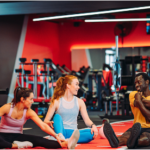Introduction
In today’s fast-paced world, maintaining good health is essential, and one aspect of overall health that often goes overlooked is bone density. Strong and healthy bones provide a solid foundation for our bodies and play a crucial role in mobility and overall well-being. This article aims to provide you with simple yet effective tips to improve your bone density and ensure optimal skeletal health. So let’s dive in and discover the secrets to building strong and resilient bones!
Why is Bone Density Important?
Before we delve into the tips for improving bone density, let’s first understand why it is essential. Bone density refers to the amount of mineral matter, such as calcium and phosphorus, present in your bones. Adequate bone density is crucial for maintaining bone strength, preventing fractures, and reducing the risk of osteoporosis, a condition characterized by weak and brittle bones.
Low bone density can lead to increased susceptibility to fractures, especially in older adults. The global incidence of hip fractures alone is expected to rise by 310% in men and 240% in women by 2050. Therefore, it is imperative to take proactive steps to improve and maintain bone density throughout your life.
One of the most effective ways to improve your bone density is through a well-balanced diet. The foods we consume provide the essential nutrients needed for healthy bones. Here are some dietary tips to enhance your bone health:
- Calcium-Rich Foods
Calcium is a key nutrient for strong bones, and consuming calcium-rich foods is crucial for improving bone density. Include dairy products such as milk, cheese, and yogurt in your diet, as they are excellent sources of calcium. If you are lactose intolerant or follow a vegan diet, opt for plant-based calcium sources like kale, broccoli, almonds, and tofu.
- Vitamin D for Calcium Absorption
Vitamin D plays a vital role in calcium absorption, and without adequate levels of vitamin D, your body won’t be able to utilize the calcium effectively. Spend some time outdoors in the sunlight to naturally synthesize vitamin D. Additionally, incorporate foods rich in vitamin D, such as fatty fish (salmon, mackerel), egg yolks, and fortified cereals, into your diet.
- Magnesium for Bone Health
Magnesium is another essential mineral that contributes to bone health. It aids in the conversion of vitamin D into its active form and plays a crucial role in calcium metabolism. Include magnesium-rich foods in your diet, such as spinach, Swiss chard, pumpkin seeds, and black beans.
- Phosphorus for Bone Strength
Phosphorus works alongside calcium to build strong bones. Ensure that your diet includes phosphorus-rich foods like seafood, lean meats, poultry, dairy products, nuts, and legumes.
- Vitamin K for Bone Formation
Vitamin K is essential for bone formation and plays a vital role in improving bone density. Incorporate leafy greens such as kale, spinach, and collard greens into your meals to boost your vitamin K intake.
- Reduce Sodium Intake
High sodium consumption can lead to increased calcium excretion through urine, which can negatively impact bone health. Limit your intake of processed and packaged foods, as they often contain high amounts of sodium. Opt for fresh, whole foods and flavor your meals with herbs and spices instead.
Physical Activity for Strong Bones
In addition to a healthy diet, engaging in regular physical activity is paramount for improving bone density. Here are some tips to get moving and strengthen your bones:
- Weight-Bearing Exercises
Weight-bearing exercises are activities that require your body to work against gravity while being on your feet. These exercises include walking, jogging, dancing, and stair climbing. By regularly participating in weight-bearing exercises, you stimulate your bones to become stronger and denser.
- Strength Training
Incorporating strength training exercises into your fitness routine can significantly benefit your bone health. Resistance exercises like lifting weights, using resistance bands, or performing bodyweight exercises like push-ups and squats help promote bone formation and increase bone density.
- Balance and Stability Exercises
Maintaining good balance and stability is crucial, especially for older adults who are at a higher risk of falls and fractures. Activities like yoga, tai chi, and Pilates can help improve balance and stability, reducing the risk of bone-related injuries.
- Engage in Sports
Participating in sports such as tennis, basketball, and soccer can provide a fun and engaging way to enhance bone density. The dynamic movements involved in sports help stimulate bone growth and improve overall bone health.
Conclusion
Taking care of your bone health is essential for overall well-being and maintaining an active lifestyle. By incorporating the simple tips mentioned in this article, such as following a bone-healthy diet and engaging in regular physical activity, you can significantly improve your bone density and reduce the risk of fractures and osteoporosis. Remember, building strong bones is a lifelong process, so make these tips a part of your daily routine for long-term skeletal health.





